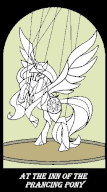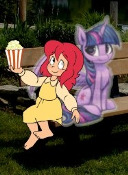Western Reviews: The Big Trail (1930) · 9:00pm Nov 28th, 2014
Two Royal Sisters Review Westerns
The Big Trail
Luna: One of my readers made the intriguing suggestion that I should start reviewing the genre of motion picture known as the “Western”. McPoodle agreed with me and, as he is currently in Canterlot assisting my sister, convinced her that she should participate as well.
Celestia: I thought it would be a good opportunity for me to learn more about one of Equestria’s most significant trading partners, seeing as this is apparently a partially-mythologized version of America’s history. Also, I do appreciate any time spent with you, Luna.
Luna: And I appreciate you too, Tia. Don’t give me that look, I do! I just sometimes have difficulty putting my feelings into words. But the readers aren’t here for our banter! Once I learned that there are apparently thousands of different films in the Western genre, I asked McPoodle to provide a list of films for us to watch, and although he claimed not to be very fond of Westerns, he was able to quickly provide a list, the first of which was The Big Trail, from 1930. A bit slow to my taste, but with some incredible American scenery. What did you think?
Celestia: The Big Trail was the heart-breaking tale of a band of horses and cattle who cross from Missouri to Oregon, suffering tremendous losses along the way. There may have been some humans who came along as well...I don’t recall.
Luna: Very funny, sister. The characters in this story do suffer (speaking humans and “dumb” animals alike) a great deal in this picture, and for the majority of its length we were left without any reason stated why these settlers would wish to inflict such pain upon themselves when the land they departed did not look that bad of a place to live. Finally at the end, we get a speech from the main character of Breck Coleman (played by an actor named John Wayne), that attempts to put things in perspective for curious aliens such as ourselves. “We’re building a nation, so we’ve got to suffer,” he says. “You gotta fight—that’s life,” he says. “And when you stop fighting, that’s death,” he says.
Celestia: It’s a very unfortunate way of looking at life, I think. It belies an assumption that they are not supposed to be there, that they are in the wrong, and have to sacrifice in suffering and even life before they can earn the right to happiness, to security, to have a nation. I know enough of America’s history to understand where this opinion comes from. I just find it unfortunate for anyone unlucky enough to get in America’s way.
Luna: I was rather surprised at how well the film treated the Native Americans, the particular obstacle slated to be the settler’s foe. Breck was raised by some of them (the Pawnee? I wasn’t keeping notes at that point), and the settlers are assisted by some of the tribes they encounter: the Shawnee and the Shoshone. Other tribes, the Cheyenne and Crow, are enemies, not only of the settlers, but of the friendly tribes. They fear the consequences of settlement to their way of life, and history would prove these fears to be well-founded. Of course, the majority of the white characters in the movie that have anything to say about the Indians are at the very least casually racist, but that was to be expected of the period depicted.
Celestia: When exactly was this story supposed to have taken place?
Luna: Around 1840 according to Wikipedia, based on some rather sound evidence.
Celestia: So before the American Civil War.
Luna: Yes. Now let’s look into some specific aspects of the movie, starting with the protagonist. Breck, like the film’s treatment of Indians, managed to surprise me. Near the very start, we’re told that he’s hunting down the men responsible for the murder of a friend of his, Old Ben Griswell. Given that “frontier justice” was in play, I expected that he would have a shootout with trail boss Red Flack (Tyrone Power, Sr.) and his toady Lopez (Charles Stevens) as soon as Breck learned that they had profited from selling Griswell’s rabbit skins.
Celestia: By the way, that had to be one of the most unintentionally-terrifying moments I have yet witnessed in human cinema, that scene set in the trading outpost, with the walls and tables just covered with animal skins.
Luna: Yes, I spotted the pony hide as well. Anyway, to get back to my point about Breck, he carefully and skillfully built up a case against his two suspects, despite the fact that he had no intention of ever bringing the two to a formal trial if he concluded that they were guilty. He spoke casually to both of them individually, proving that they were lying to cover up their relationship with one another. He survived a murder attempt that he strongly suspected was the work of Flack’s associate Bill Thorpe (Ian Keith), and still refused to do anything more than tell the three that he was on to them.
Celestia: Yes, he seemed to me to pass from would-be lawpony into a human with a death wish at that point.
Luna: It was only when Lopez had tried to kill him, leaving behind as the murder weapon Griswell’s own hunting knife, that Breck felt justified in hunting down the two surviving villains—Thorpe having been killed earlier trying to shoot down Breck. Even when he caught up to Flack, he made sure to call out to him, give his opponent the chance to get one shot in, before using his trademark knife-throwing skills to take him out.
Celestia: Yes, but you will admit that Breck had the high ground. It would have been much harder for Flack to shoot Breck than for Breck to hit Flack.
Luna: Well, I suppose that goes to show that the honor of frontier justice will only go so far, and after that it just gets silly to insist on things like “level ground”. Moving on—Ruth, played by Marguerite Churchill. Didn’t like her.
Celestia: I believe that Ruth, and the Cameron family in general, were meant to symbolize the transition necessary between being a civilized American and a settler American. But yes, Ruth was far too naive for my liking.
Luna: And far too stubborn in not getting over her bad first impression of Breck. Sure, what he did was rude and really stupid, but most of his actions since then showed his respect for her, and even when he screwed up, she should have been able to judge his sincerity. But of course, this was the same woman who believed that the con artist Thorpe was a worthy suitor until after he proved his character by the manner of his death. It is my belief that the inevitable marriage of Breck and Ruth at the end of the picture will be nothing but trouble for him, as she will insist on keeping parts of her civilized life that are inappropriate in this setting, and doubly inappropriate for the barely-civilized Breck. By way of contrast, we have the character of Gus’ mother-in-law (no true name provided, played by Louise Carver), who spends her time bullying the hapless (but somewhat deserving of our scorn) Gus (Ed Brendel), and not having any other contribution to the plot.
Celestia: Did Gus and his family even need to be in this movie?
Luna: No. If these were the only women in this movie, I would be disappointed, but there was a prominent non-speaking part given to a woman who did some of the heaviest lifting—I was impressed.
Celestia: Actually, there was a lot of interesting things going on that was outside the plot and the speaking characters. This film was clearly made with a really large cast of humans and animals, across a wide variety of settings. The river crossing, for example, was a nearly silent scene of suffering, most of it of the four-legged variety.
Luna: I suppose I should make it clear to our readers that we ponies have a limited ability to read emotions on earth equines that appears to be superior to the abilities of most humans. That made it clear to us that the animals in this picture were more or less being well cared for. Most of them had no idea why the humans were directing them to act like a raging river was sweeping them to their doom, but I saw one or two would-be actors among the cows and horses. In particular, there was Old Charlie, Davie Cameron’s horse, who quite relished his death scene.
Celestia: Not just cows and horses, either. There was a very effective scene after the Indian shootout, where the settlers are burying their dead, including a baby. As the survivors very reluctantly return to the caravan, the family’s dog lies beside the newly turned earth, as he undoubtedly had lain every night beside the babe as she slept. I had tears in my eyes at how well the canine actor sold that part. In contrast with that is the mountain crossing scene, where I believe the majority of casualties were humans. And of course there was the Indian attack, where I was struck by how the humans used their caravans to protect the panicking animals from harm. So, is there anything else you’d like to cover?
Luna: Not much. The villains did their jobs as characters, but weren’t all that memorable, other than the fact that Tyrone Power, Sr. looks exactly like a live-action version of the Popeye villain Bluto.
Celestia: Bluto?
Luna: Ask Pinkie Pie. Ruth’s brother Davey (David Collins) was a non-entity. Breck’s sidekick Zeke (Tully Marshall) surprised me in having more to do that just be a foil to Breck’s soul-searching and exposition. As a contrast to Gus, I was actually sorry to hear of the death of Zeke’s friend Windy Bill (Russ Powell) to the attacking Cheyenne, despite the fact that he was just comic relief. The Bascom family introduced at the beginning of the film as the leaders of the settlers acted as Breck’s supporters whenever Flack tried to turn the other settlers against him.
Celestia: Can I say something about the title cards?
Luna: Sure.
Celestia: I didn’t like them. I mean, let me quote from the one that appears right at the beginning of the movie: “Dedicated to the men and women who planted civilization in the wilderness and courage in the blood of their children.” What is the meaning of that part? Is it a metaphor for familial peer pressure? “Your forebears died to reach Oregon, so you better not disappoint them by becoming a hair stylist instead of a linebacker for the Seattle Seahawks?”
Luna: That was oddly specific. But yes, those cards were completely useless. However, the film came out in 1930, right after the transition from silent pictures. Perhaps the audience was just not used to a film without title cards?
Celestia: How about the fact that every one of those cards was decorated with cattle skulls?
Luna: Yeah, I thought that was in bad taste. But overall, I thought it was an alright Western to start with. At the very least, it gave me a feel for just how big the American West is, and how varied its landscapes are. I believe most Westerns are also set in later eras, so this film delimits the territory both spatially and temporally.
Celestia: Indeed.






And so begins a new series of reviews, with my sister's participation, of all things. I do not expect a 100% positive reaction to our views.